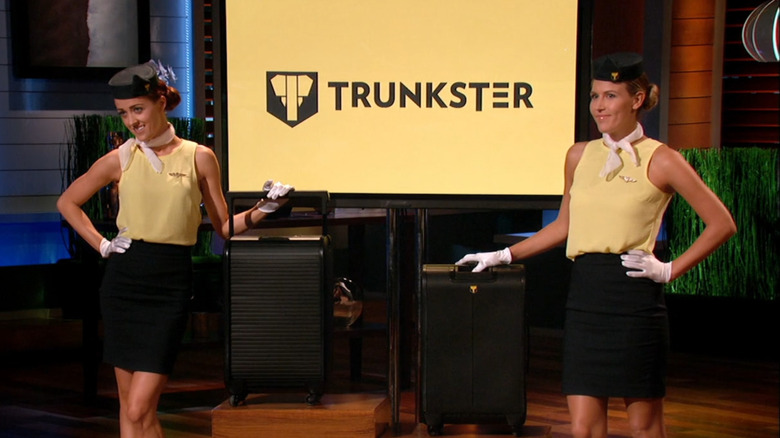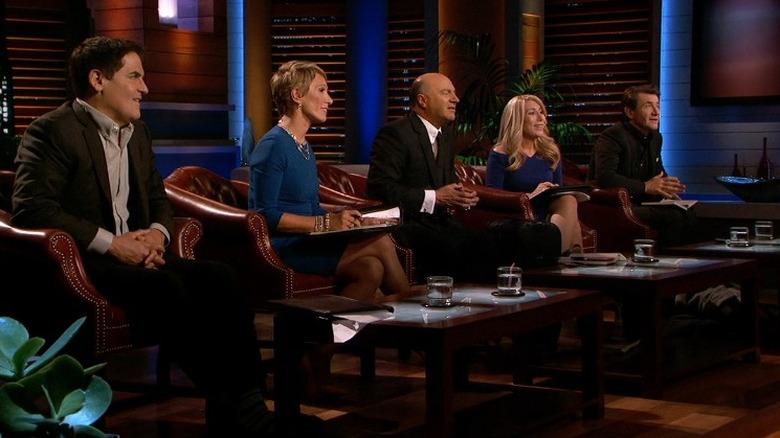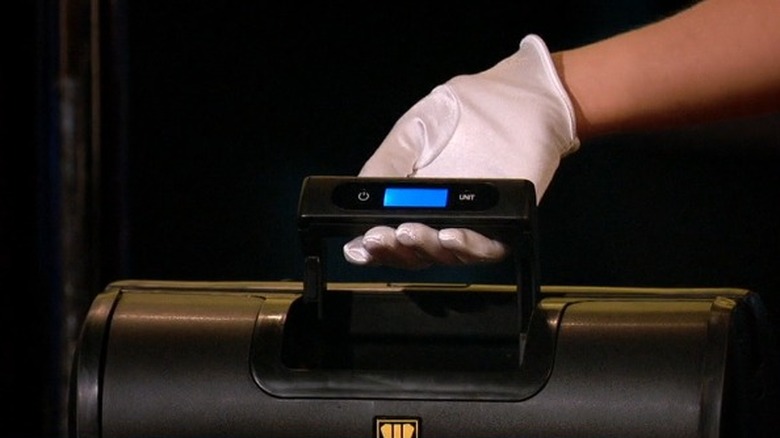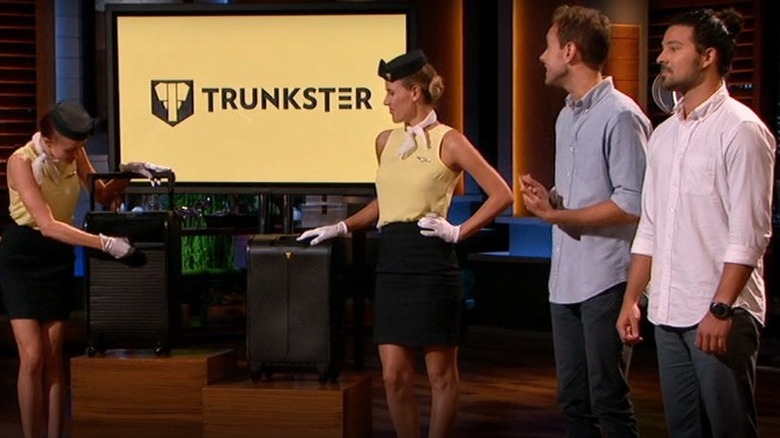What Really Came Of Trunkster Smart Luggage From Shark Tank?
When Trunkster Smart Luggage made its debut on "Shark Tank" back in 2015, the founders — Jesse Potash of New York and Gaston Blanchet of Argentina — claimed it would completely disrupt the luxury luggage market. And who could disagree? With its garage door style opening, sleek hardshell design, and built-in tech to track your luggage, weigh it, and keep your devices charged, the Trunkster was set to make waves at a premium price of $395.
Jesse explained that the idea for Trunkster came to him when he visited a luggage store and realized that all the products looked exactly the same. As a millennial, he wanted to create a luxury luggage brand that had a soul and a story behind it. Well, apparently, more soul equates to more money since the pair presented an astronomic valuation for their product. Though they had yet to actually deliver a single Trunkster, they raised $1.4 million on Kickstarter — reaching their goal in an hour — and sold $2 million in pre-orders, leading them to value their company at $28 million.
Did they aim too high? The Sharks certainly thought so, but that didn't stop a few from circling the waters and taking a bite out of this company. But what happened to Trunkster, and what are their founders doing now? Well, you're probably in for quite a shock — the business appears to have failed spectacularly.
Trunkster founders meet their match with Lori and Mark
Jesse Potash and Gaston Blanchet pulled no punches when pitching their million-dollar smart luggage idea. However, the savvy business moguls of "Shark Tank" suggested a more reasonable valuation of $5 to 8 million. The Trunkster founders refused to budge on their valuation even after admitting to only investing $5,000 of their own money, which went toward launching their Kickstarter campaign, and not having actually delivered any units.
Barbara was the first to bow out of negotiations after remarking that the design was simply too masculine and too heavy. She said she also couldn't justify investing in a product that had no customers. Lori then jumped in with an offer, positioning her connections with HSN and her knowledge of the luggage world with an offer of $1.4 million to fulfill purchase orders for a 15% stake in their company. Mark didn't make an offer but said he was willing to work together with Lori. After a quick chat away from the Sharks, the founders asked for $1.4 million in exchange for a 5% stake. The investment was to be repaid in 24 months, and if not, the equity would increase to 10%, and the Sharks would receive $1 per unit sold until the investment was paid in full. The Sharks accepted this offer, and everyone walked away happy.
Trunkster's fate after Shark Tank
What's not often shown at the end of the "Shark Tank" episode is what actually happens afterward. Some viewers might be surprised to learn that there is an extensive due diligence process that both the business owners and investors need to go through before any money is exchanged. Unfortunately, in the case of the Trunksters, Mark and Lori encountered a series of issues with the product (specifically with the internal scale and GPS), and also had trouble working coherently with the founders. Ultimately, the deal fell through.
After what was likely a huge disappointment for the founders, the pair then came up against manufacturing delays in 2016 and were unable to fulfill the majority of the pre-orders placed on Kickstarter. Of the ones that were delivered, many reported the quality was not up to snuff for the price tag. Though the company limped along for a short time after, it appears to have permanently shuttered its doors. Suffice to say the Sharks probably dodged a bullet with this one; what could have been another Cincha Travel Bag turned out to be another idea that fell short.
Here's what sent Trunkster packing
Though Trunkster's product was an innovative piece of travel hardware back in 2015, the company simply couldn't keep pace with a market that was already jumping onto the smart luggage bandwagon. Bigger and more established luggage companies were doing it better, faster, and cheaper than Trunkster by the time they hit the market. Combined with the manufacturing delays that pushed back deliveries to 2017, customers were fed up before even receiving their product, and any grace they would have given to a first-gen prototype was long gone.
Per comments on their Kickstarter page, there are mostly angry investors demanding their money back. Despite the many bad reviews, some seem to really like it and are holding out hope for a comeback so they can purchase another. However, the last update made by Trunkster was back in February 2017, so the chances of that happening are slim to none.
The primary reason attributed to their demise, though, is that they simply missed their mark with their customer base. The luggage was too expensive for budget-conscious consumers and just couldn't compare to similarly priced smart luggage that had more features and were of a higher quality.
Where the Trunkster founders have ended up
As for what's happened to Jesse Potash and Gaston Blanchet, it's all a bit mysterious. After the company went under, Potash, basically went MIA. Not only has he made no public appearances or statements about Trunkster since its failure, he simply hasn't left any digital tracks behind at all.
As for Gaston Blanchet, he has gone on to co-found a new business called Storypod, an educational audio system for children that helps them build skills through music and storytelling. While it essentially looks like an Alexa for kids, Blanchet was able to raise over $240,000 on Kickstarter and is now the company's CMO. The product is really well-received and has earned 4.8 stars with over a thousand reviews with lots of positive comments.
Though the pair did not find success with Trunkster, we hope Potash is enjoying a non-luggage-related life of privacy offline and that Blanchet continues to enjoy the success he's found with his new company. We're sure many important lessons were learned throughout their smart luggage journey.
"Shark Tank" is available to purchase on Prime Video.




